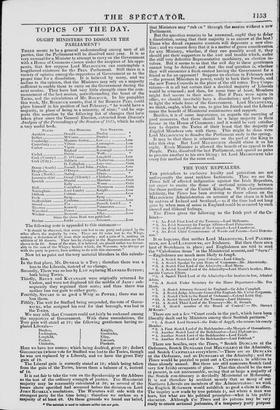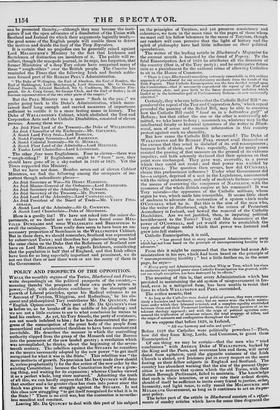THE TORY REPEALERS.
THE pretenders to exclusive loyalty and patriotism are not unfrequently the most reckless factionists. Thus we see the Times full of affected indignation against the Irish Repealers, yet eager to excite the flame of sectional animosity between the three portions of the United Kingdom. With characteristic infelicity, the Times has been striving to throw odium on the MELBOURNE Administration on account of the share in it held by natives of Ireland and Scotland,—as if the time had not long gone by when men of sense in England could be actuated by such absurd and illiberal feelings. The Times gives the following as the Irish part of the Ca- binet— " 1. An Irish First Lord of the Treasury—Lord Melbourne. " 2. Art Irish Secretary for Foreign Affairs—Lord Palmerston. " 3. An Irish Lord President of the Council—Lord Lansdowne.
"4. An Irish Chief Commissioner of Woods and Forests—Lord Duncan- non."
It so happens, that neither Lord MELBOURNE, Lord PALMER- STON, nor Lord LANSDOWNE, are Irishmen. But then there are a host of Scotehmen in place ; and Englishmen are told to read the "Caledonian items" in the Ministerial account, and "burn!" —Englishmen are much more likely to laugh.
" 1. A Scotch Secretary for your Colonies—Lord Glenelg. "2. A Scotch Speaker for your House of Commons—Mr. Abercromby. "3. A Scotch First Lord of the Admiralty—Earl Minto. "4. A Scotch Second Lord of the Admiralty—Lord Minto's brother, Hon.. °Livable Captain Elliott.
"5. A &wick Third Lord of the Admiralty—his brother-in-law, Admiral Adam.
"0. A Scotch Under Secretary for the Home Department—Mr. Fox Maule.
"7. A Scotch Attorney-General for England—Sir John Campbell. "8. A Scotch Judge Advocate-General for England-Mr. Cutlar Ferguson. "9. A Scotch Clerk to the Board of Ordnance—Colonel Leith Hay.
"10. A Scotch Second Lord of the Treasury—Lord Dalmeny. " 11. A Scotch Third Lord of the Treasury—Mr. R. Steuart.
" 12. A Scotch member of the Board of Control ! — Mr. Stewait BPKenzie."
There are not a few "Court cards iii the pack, which have been liberally dealt out by Ministers among their Scottish partners."
"1. A Scotch Lord Steward—the Duke of Argyll, who returns his county Member.
"2. A First Scotch Lord of the Bedehatuber—the Marquis of Queensberry. " 3. Another Scotch Lord of the Bedchamber—Lord Elphinstone. "4. Another Scotch Lord of the Bedchamber—Lord Erroll.
"5. Another Scotch Lord of the Bedchamber—Lord Falkland."
There are besides' says the Times, " Scotch DUNCANS at the Ordnance, Scotch DUNDASES (not MELVILLES) at the Admiralty, and Scotch CAMPBELLs everywhere."—There are no Dusc ANS at the Ordnance, and no DUNDASES at the Admiralty ; and the Times would be puzzled to point out a CAMPBELL in addition to those already named. But there are still numerous Scotch (and very few Irish) occupants of place. That this should be the case at present, is not unreasonable, seeing that so large a majority of the Scotch constituency is decidedly Ministerial or Reforming. It is not therefore by accident merely that so many of our Northern Liberals are members of the Administration : we wish the Englidi Reformers would establish as good a claim to office. The iuquiry naw wade by true patriots i, not where a man was born, but what are his political principles—what is his public character. Although Vie Times and its patrons may be very ready to create sectional jealousies, if a temporary party purpose
can be promoted thereby,—although they may become the insti- gators if not the open advocates of a dissolution of the Union with
Scotland and Ireland (to which their arguments logically tend),— the good sense of the English people will enable them to detect the motives and deride the fury of the Tory Repealers.
It is certain that no prejudice can be generally raised against Lord MELBOURNE'S Ministry by the fact that Irishmen and
Scotchmen of distinction are members of it. The public will re- collect, though the renegade journal, in its rage, has forgotten, that former Ministries of a deep Tory colour have comprised many of these" rough-riders" over the British people. The Courier has reminded the Times that the following Irish and Scotch noble- men formed part of Sir ROBERT PEEL'S Administration.
" The Duke of Wellington, the Earl of Aberdeen, the Earl of Rosalyn, the Earl of Haddington, Lord Maryborough, Lord Stormout, Mr. G. Dawson,
Colonel Perceval, Admiral Beresford, Sir G. Cockburn, Mr. Maurice Fitz- gerald, Sir A. Craig Grant, Sir George Clerk, and the Earl of Roden ; in all fourteen representatives of the two other parts of the empire."
But the PEEL Ministry was a mere "flash in the pan ;" we prefer going back to the Duke's Administration, which main- tained itself long enough and carried measures of importance sufficient to entitle it to a more lasting name in history. The Duke of WELLINGTON'S Cabinet, which abolished the Test and Corporation Acts and the Catholic Disabilities, consisted of eleven persons. Among them were
An Irish First Lord of the Treasury—the Duke of WELLINGTON. An Irish Chancellor of the Exchequer—Mr. GOULBURN.
A Scotch Lord Privy Seal—Lord ROSSLYN. A Scotch Foreign Secretary—Lord ABERDEEN. A Scotch Colonial Secretary—Sir G. MURRAY. A Scotch First Lord of the Admiralty—Lord MELvILLE.
A Yankee Lord Chancellor—Lord LYNDHURST.
The other four were Englishmen. Four to eleven—there was "rough-riding If Englishmen ought to " burn " now, they should have gone off' in a sky-rocket in 1828 or 1829. Yet the Times supported this Ministry. But we have not done. Besides seven out of eleven Cabinet Ministers, we find the following among the occupants of im- portant though subordinate places— An Irish Secretary at War—Sir HENRY HARDINGE. An Irish Master-General of the Ordnance—Lord BERESTORD.
An Irish Secretary of the Admiralty—Mr. CROKER. An Irish Secretary of the Treasury—Mr. DAWSON. An Irish Lord of the Admiralty—Lord CASTLEREAGH. An Irish President of the Board of Trade—Mr. VESEY Frrz- GERALD.
A Scotch Lord of the Admiralty—Sir G. COCKBURN. A Scotch Lord Chamberlain—Duke of MONTROSE.
Here is a goodly list ! We have not raked into the minor de- partments, or we doubt not we should have found some MEL- viLLE DUNDASES and some WELLESLEYS and BERESFORDS to swell the catalogue. There really does seem to have been an un- necessary proportion of Scotchmen in the WELLINGTON Cabinet. But in those days, we should remember, Scotland was represented by subservient Tories ; and therefore her place-seeking sons had the same claim on the Duke that the Reformers of Scotland now have on Lord MELBOURNE. As regards Irishmen, considering that the population is half that of England, and that Irish affairs have been for so long especially important and prominent, we do not see that then or now there were or are too many of them in the Government.



























 Previous page
Previous page